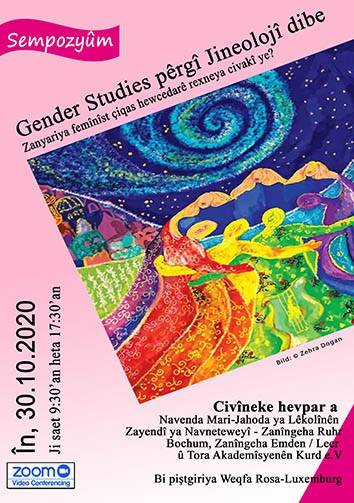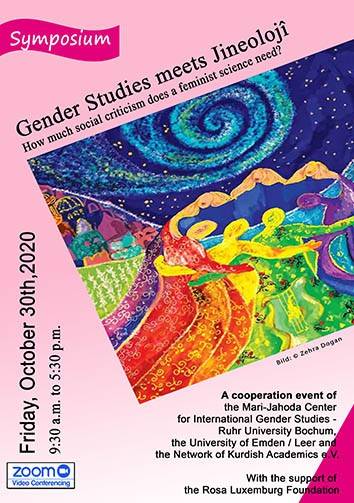Conference of Experts

Gender-Studies meets Jineolojî
How much social criticism does a feminist science need?
30 October 2021
9:30 am – 5:30 pm
via Zoom
A cooperation event of Marie Jahoda Center for International Gender Studies – Ruhr-University Bochum, University of Applied Sciences Emden/Leer and Network of Kurdish Academics
Supported by Rosa Luxemburg Foundation
The Theme
The Kurdish women’s movement with its ideas and practice for the realisation of a democratic, gender-liberated and ecological society stands for an independent approach of social analysis. Based on the understanding that social change needs education and new forms of knowledge as a basis, the Jineolojî (“the science of women”) was developed as a new form of science. Existing feminist theories and experiences of women’s movements from other regions of the world are critically evaluated and further developed. The idea is “to go beyond feminism, to surpass feminism and at the same time contribute to feminism” (Jineolojî Committee Europe 2018: 44). Scientific criticism and the critique of existing social injustices and (environmentally) destructive practices are not carried out as separate theoretical analyses, but in connection with concrete social projects, such as in Rojava (Democratic Federation of Northern and Eastern Syria): Self-managed multicultural multi-religious area since 2012). This means both new educational institutions for higher and social education, places of meeting and strengthening women’s (rights), new forms of living together such as the women’s village of Jinwar, ecological production methods, for example in (women’s) cooperatives, the shaping of social decision-making processes in autonomous women’s structures as well as in equal participation, among other things with dual leadership in all management tasks and, last but not least, the Jineolojic character of the social contract.
This symposium will impart knowledge and discourse on the Jineolojî approach and seek to engage with gender studies. Experts from both approaches to science – Jineolojî and Gender Studies – will be invited to take part in the conference and stimulate a lively discussion on the appropriateness and intentions of various approaches to gender-critical social analysis.
Coordinators: Dr. Muriel González Athenas, Ruhr-University Bochum; Dr. Mechthild Exo, University of Applied Sciences Emden/Leer; Dersim Dağdeviren, Co-Chair of Network of Kurdish Academics; Münevver Azizoğlu-Bazan, Bremen University
The Programme
Opening remarks: Dersim Dağdeviren, Co-Chair of Network of Kurdish Academics
Greetings: Beate von Miquel, Managing Director of the Marie Jahoda Center for International Gender Studies – Ruhr University Bochum
I. What is Jineolojî? What do Gender Studies do?
Introduction to the approaches and their subject areas
Dr. Dilar Dirik, sociologist, Oxford University
Jineolojî: from a concept to theory
Dr. Christine Löw, political scientist, Frankfurt University
Gender Studies: On women’s movements, the relationship between practical theory and feminist criticism of social inequalities
Keynote speech: Şervîn Nûdem, Jineolojî Academy Qamislo, Democratic Federation of North- and East-Syria
Gender Studies and Jineolojî: a meeting of different approaches
Moderation: Münevver Azizoğlu-Bazan, social scientist, Bremen University
II. Gender issues in the political context
Links to the goal of radical change in society
Havin Güneşer, International Initiative Freedom for Abdullah Öcalan – Peace in Kurdistan
Rojava/Democratic Federation of North- and East-Syria – lived Jineolojî
Dr. Muriel Athenas, historian, Ruhr-University Bochum
Feminism – Criticism and challenges
Moderation: Dr. Mechthild Exo, Peace and conflict researcher, University of Applied Sciences Emden/Leer
Final comment: Dr. Marlene Schäfers, Political Anthropology, Gent University
Participation modalities:
Please register by 25.10.20 at info@kurd-akad.com. The zoom link will be sent by email after the end of the registration period.

